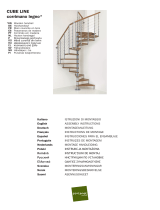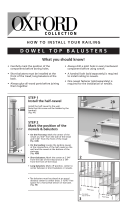Page is loading ...

nice
ø 160 cm
d. 63 "
Italiano ISTRUZIONI DI MONTAGGIO
English ASSEMBLY INSTRUCTION
Español INSTRUCCIONES PARA EL ENSAMBLAJE
Français INSTRUCTIONS DE MONTAGE

6 - NICE Ø 160 cm (D. 63")
English
Before starting with assembly unpack all the parts of the staircase. Arrange them on an ample surface and check
the quantities (TAB. 1: A = Code, B = Quantity).
Preliminary assembly
1. Decide the ascending direction of rotation and the angle of rotation (Fig. 6) before drilling the treads L31 using
a 5 mm (
13
/
64
”
) diameter bit. Assemble and fasten the parts F23 on the lower part of the treads L31 using the
parts C89, C13, B02. Consider that the convex part of the tread must remain at the front going up. Repeat this
operation underneath the landing part with indentation E04 (Fig. 2).
2. Assemble the parts BE3, CC5, CC6 onto the baluster (C03) (g. A).
3. Carefully measure the oor to oor height to determine the number of spacer rings D45 required and prepare
them above each spacer D47 (TAB. 2).
4. Assemble the base G03 with the parts B17 and B46 (Fig. 1).
Assembly
5. Determine the centre of the opening on the oor and position the base (G03 + B17 + B46) (Fig. 3).
6. Drill with a 12 mm (
15
/
32
”
) diameter bit and fasten the base G03 + B17 + B46 to the oor using the parts C88,
C91 and C85 (Fig. 1).
7. Screw the tube G02 onto the base (G03 + B17 + B46) (Fig. 1).
8. Fit the parts in the following order: spacer rings D45, spacer D47, spacer rings D45, the rst tread L31, spacer
rings D45, spacer D47, spacer rings D45, the second tread L31, and so forth. Arrange the treads alternately on
the right and left so that the weight is evenly distributed (Fig. 4).
9. Once you have reached the end of the tube G02, screw on the part B47, screw on the next tube G02 and
continue to assemble the staircase (Fig. 4).
10. Once you have reached the end of the tube G02, screw on the part B46 and the part G01; the latter must
exceed the staircase height by about 15 cm (5
29
/
32
”
) (Fig. 5). Continue tting the treads using the part D01
assembled on the nal treads L31 not centred on the pole G02.
11. After tting all the treads L31, t the landing oor E04 (Fig. 7).
12. Fit the parts B05 and B04 and tighten the part B03 sufciently, considering that the treads must still rotate
(Fig. 1).
Fixing the landing
13. Move the part F12 close to the oor. Determine the position keeping a distance of about 15 cm (5
29
/
32
”
) from the
edge of the landing E04. Drill with a 12 mm (
15
/
32
”
) diameter bit and nally fasten using the parts C88, C91 and
C85 (Fig. 1).
14. Fasten the parts F12 to the landing E04 using the parts C89 drilling the landing E04 with a 5 mm (
13
/
64
”
)
diameter bit after checking that the landing is perfectly horizontal.
Assembling the railing
15. Fan out the treads L31. You can now climb the stairs.
16. Starting from the landing E04, t the long balusters C03 (H. 1190 mm - 46
7
/
8
”
) connecting the treads
L31 keeping the holes of part BE3 oriented towards the centre of the staircase and in such a way that the
countersink of the part remains facing the inside of the railing.
17. Check that all the balusters C03 positioned are vertical. Be very careful during this operation, since it is very
important for successful assembly.
18. Finally tighten the balusters C03 to the treads L31 by screwing on the parts B02.
19. Again check that the balusters C03 are vertical and, if necessary, correct by repeating the operations described
in points 16, 17 and 18.
20. Fasten the part F01 on the oor next to the rst baluster C03 drilling with an 8 mm (
5
/
16
”
) diameter bit. Use the
parts C90, B12 and B02 (Fig. 1).
21. Position the rst baluster C03 (H. 1190 mm - 46
7
/
8
”
) together with the reinforcement part F07.
22. Finally tighten the part B03 (Fig. 7).
23. Heat the handrail A02 until it is pliable:
1) Place the handrail on the cover of the wooden crate
2) Heat for about ve minutes making circular movements without stopping and make sure that the ame does
not come into direct contact with the handrail

7 - NICE Ø 160 cm (D. 63")
3) Turn over the handrail and repeat the operation (Fig. 8). It is advisable to wear protective fabric gloves during
this operation.
24. Before it cools down, position the handrail A02 on the balusters C03 starting from the top (Fig. 7).
25. Drill the handrail A02 in correspondence to the holes in the end part of the baluster BE3 using a 5 mm (
13
/
64
”
)
diameter bit and x using the parts B54 and B55.
26. In quick succession, t the balusters C03 (H. 1060 cm - 41
3
/
4
”
) and C03 (H. 1130 mm - 44
1
/
2
”
) to the part F23
making sure that they are vertical. Tighten the part B02 and fasten the balusters to the handrail A02 using the
parts B54 and B55.
27. Cut the excess handrail A02 in correspondence to the rst baluster C03 of the staircase.
28. Complete the handrail A02 by xing the parts A03 using glue X01 (Fig. 1).
29. Join the end part of the railing to the section of the balustrade on the landing E04 using the appropriate xture
obtained by assembling the parts A20, A03, C92 and B08 (Fig. 9).
30. Join the xture obtained to the handrail A02 using the screws C87 after drilling the holes underneath the
handrail using a 2.5 mm (
3
/
32
”
) diameter bit (Fig. 9).
31. To complete the balustrade on the landing E04, position the parts F01 using the parts C89 and B02. Drill
the landing E04 using a 5 mm (
13
/
64
”
) diameter bit, keeping the distance between the holes the same as that
between the balusters C03 of the railing assembled previously. Fit the balusters C03 (H. 935 mm - 36
13
/
16
”
) to the
parts F01 positioned on the landing E04. Position the handrail A18 on the balusters and drill in correspondence
to the holes in the end part BE3 of the baluster using a 5 mm (
13
/
64
”
) diameter bit and fasten the parts B54 and
B55. Complete the handrail A18 by xing the parts A03 using glue X01 (Fig. 1).
32. Complete railing assembly by tting the parts B82 to the lower part of the balusters C03 (Fig.1).
Final assembly
33. To further stiffen the staircase at intermediate points, fasten the parts F09 on the wall and join them to the
balusters C03 using the parts F08. Drill using an 8 mm (
5
/
16
”
) diameter bit and use the parts C50, C49, C90,
B12 (Fig. 10).

Italiano DATI IDENTIFICATIVI DEL PRODOTTO
English PRODUCT DETAILS
Español DATOS DE IDENTIFICACIÓN
Français DONNÉES D’IDENTIFICATION DU PRODUIT

24 - NICE Ø 160 cm (D. 63")
product identification data
trade name: NICE Ø 160 cm (D. 63")
type: spiral round staircase
materials used
STRUCTURE
description
composed of metal spacers (1) and plastic spacer rings (2) stacked and compressed on the modular central pole (3)
materials
spacers: Fe 370
spacer rings: nylon
pole: galvanised Fe 370
finish
spacers: epoxy powder coated in furnace
TREADS
description
round wooden treads (4) stacked on the central pole (3)
materials
birch blockboard
RAILING
description
composed of vertical metal balusters (5) fastened to the treads (4) and a PVC handrail (6)
materials
balusters: Fe 370
handrail: PVC
xings (7): nylon
finish
balusters: epoxy powder coated in furnace
CLEANING
clean with a soft cloth moistened in water; do not use any product containing solvents or abrasive materials.
MAINTENANCE
approximately 12 months from the date of installation, check tightness of the screws of the various components.
extraordinary maintenance must be carried out by qualied persons. contact the manufacturer.
PRECAUTIONS FOR USE
avoid improper use and unsuited to the product. any tampering with or installation not according to the instructions
provided by the manufacturer may result in the product no longer conforming to the standards.
EN)
/




